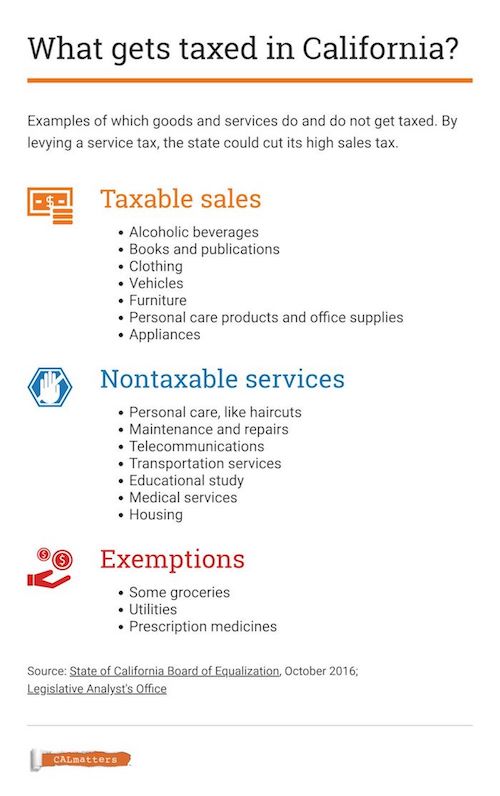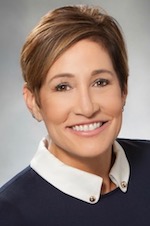Daily Business Report-May 30, 2018
Some lawmakers calculate that a new business services tax would allow the state to cut California’s high sales tax to consumers. (Morguefile)
California Could Cut Your High
Sales Tax if it Taxed Business Services
Why that won’t happen — yet
By Antoinette Siu | CALmatters
Consider these two scenarios: A family spends Saturday afternoon at the local shopping center, buying a new washing machine, summer sandals, children’s books and dog food. With every purchase, the state takes its cut, courtesy of California’s 7.25 percent sales tax.
Then consider a mid-sized advertising firm across town. It contracts with an accountant, a software developer, a lawyer and a cleaning service. Every time the company pays for these services, the state of California collects absolutely nothing.
But what if the state started getting a piece of that action?
Some state lawmakers are pushing that idea: Create a new business services tax they say would allow the state to cut California’s high sales tax to consumers and pull the state’s antiquated tax code into the 21st century.
A proposed bill would add a 3 percent tax to business services, and use the proceeds to lower by 2 percent the sales tax consumers pay at the cash register. In other words, it would be revenue neutral.
Still, that effort by Van Nuys Democratic Sen. Robert Hertzberg is a long shot for now. His bill has support from some of the state’s largest public employee unions—but more than 100 businesses and other groups oppose it. They label it a “job killer” that would trigger negative reverberations throughout California’s economy.
If California does eventually tax business services, some lawmakers next want to levy a service tax on consumers’ purchases too—car repairs, eye exams, massages, lawn services, yoga classes, haircutters and hundreds more.

The state’s tax code was created in the 1930s. Over time, people have started spending more of their income on nontaxable services than taxable goods.
Services now account for almost 80 percent of the economy, yet the state gets most of its funds from personal income and sales taxes.
Many experts argue that California needs to reduce its dependence on personal income revenue, which can decline dramatically in economic downturns or if the wealthy decide to leave. During the 2008 recession, for example, the state’s budget shrunk by 23 percent as income tax revenue plummeted—a downturn that led to state worker furloughs and massive state budget cuts.
Nonetheless efforts to rejigger the state tax code have long failed to gain traction.
But with major federal tax changes taking effect, state legislators are starting to discuss how to make the California tax system more fair and stable, reducing inequities in the system and volatility in state finances.
Hertzberg said he hopes it will jumpstart interest in state tax reform, saying federal changes have “provided an opportunity to start creating incremental change.”
He describes his Senate Bill 993 as a “modest, phased-in approach that begins to shift and expand our tax base, and it gives relief to middle and low-income taxpayers hurt most by the federal tax law.” He also contends it could raise $14 billion in its first year—and make out-of-state companies doing business in California contribute to the economy when people make use of their services within California.
An architect working in Los Angeles but building in China would not have to pay the service tax, for instance, because the service is received outside the state. In contrast, a legal consultation from a New York lawyer to a California client would be a taxable activity here.
But business groups here are unswayed.
The California Chamber of Commerce issued a statement contending that the bill would force companies to “increase prices, reduce expenses—or perhaps relocate—to accommodate this new burden. If adopted, any other state in the country will have a more business friendly tax environment than California and lower prices for the services covered. California does not need another disincentive for businesses to stay in California, locate in California, or grow in California.”
While most states tax some business and personal services, California is one of a handful of states without any service taxes.
Two states have a broad sales tax on services like the one Hertzberg proposes: Hawaii has a 4 percent tax on legal and accounting services, and New Mexico has a 5 percent tax on major businesses hiring accountants. South Dakota and West Virginia tax more than 100 services, and several states, including Colorado and Nevada, tax fewer than 20 services, according to Accountex Network.
The untapped potential for California is huge. Taxing all currently nontaxable services could generate an estimated $122.6 billion, according to a legislative analysis.
Seven years ago lawmakers sent Gov. Jerry Brown a measure to merely study the financial impact of using a broad sales tax on services to cut personal income and sales taxes—and even so, he vetoed it.
Earlier this month, Brown unveiled a nearly $9 billion surplus in a state budget that’s just shy of $200 billion. Brown has said his office is working on frameworks for a change in the tax system, but he does not see the political will to make it happen. Asked about Hertzberg’s idea for a service tax, he responded:
“It will take the business community. It will take a wide spectrum of California leaders to be able to move from where we are to where many people think we ought to go.”
Instead of taking a vote on Hertzberg’s bill after its initial hearing, the Senate Governance and Finance Committee instead opted to organize panels for and against the idea at a second hearing on the bill June 13.
“What I’m committed to is to be able to go deeper into that and bring all voices to the table,” said the committee’s chairman, Healdsburg Democrat Mike McGuire. “This is one we’re going to be talking about for quite some time,” McGuire said.
CALmatters.org is a nonprofit, nonpartisan media venture explaining California policies and politics.
_________________

Apartment Building in Ocean Beach
Sells for $6.75 Million to Mills Trust
An apartment building on the coastline in Ocean Beach has sold for $6.75 million to Mills Trust. Seller was the William R. Mundt Trust.
The apartment building, located at 5101-5107 Narragansett Ave., was built in 1973. It is a three-story building consisting of 16 units made up of studios, one-, two- and three-bedroom floor plans.
The buyer was represented by Kidder Mathews and ACRE brokers. Pacific Coast Commercial brokers represented the seller.
_________________

Newest Navy Littoral Combat Ship
Commissioned and Headed for San Diego
The littoral combat ship USS Manchester was commissioned as the Navy’s newest surface combatant vessel during a ceremony in Portsmouth, N.H., on May 26. The ship will join Littoral Combat Ship Squadron 1 and eight other littoral combat ships currently homeported at Naval Base San Diego. The vessel is the Navy’s second ship to be named for the city of Manchester, N.H.
Littoral combat ships are high speed, agile, shallow draft, surface combatant vessels designed for operations in the near-shore environment, yet fully capable of open-ocean operations. Manchester is the 12th littoral combat ship and the seventh of the Independence variant.
Navy Cmdr. Emily Basset is Manchester’s commanding officer and a Seattle native. The ship’s sponsor is, Sen. Jeanne Shaheen representing New Hampshire.
_________________

Ecologists Release Study on Resilience
of Native Plants After Major Disturbances
Ecologists from the University of California, Irvine, Center for Environmental Biology and San Diego State University have tested the resilience of native plant communities when faced with wildfire, drought and invasion by non-native species. The research, published in Ecosphere, determined whether Orange County plant communities recovered following the 2007 Santiago wildfire and the 2011-2015 California drought.
The study was possible thanks to 10 years of vegetation monitoring funded by The Nature Conservancy and the Natural Communities Coalition.
The research team used data from areas of long-term vegetation to compare changes in native and non-native (for example, wild oat and ripgut brome) plant cover in burned and unburned areas as well as responses to drought in regions with different native shrub densities. They found that coastal sage scrub, the dominant native plant community in Southern California, was generally resilient to wildfire, reaching pre-burn cover within four years. However, invasive non-native grasses increased in abundance in burned areas, suggesting long-term impacts of fire on native plants.
_________________

DonationMatch Online Platform
Launches GiveBack Program
DonationMatch Inc., an online platform that connects in-kind donations with charity fundraising events, has launched its DonationMatch GiveBack Program. The company’s latest technology connects restaurants and stores with nonprofit organizations to host in-store fundraisers. The platform not only enables nonprofits to find local opportunities but simplifies the scheduling process and makes it easier for businesses to manage workflow.
“The DonationMatch GiveBack Program expands opportunities for nonprofits both locally and across North America,” said Renee Zau, CEO and co-founder of DonationMatch. “Now restaurants, breweries, wineries, gyms, and even online retailers willing to donate a percentage of sales to their communities can do so with fewer business distractions and will benefit from new faces walking through the door.”
The GiveBack platform is intended to give companies the benefit of increased visibility through direct exposure to nonprofits and schools. The simple, automated, online platform allows businesses to accept fundraiser requests. Through a constant pipeline of events, companies have the opportunity to increase sales and new customers.
Companies that contributed to the design and ease-of-use of the GiveBack program technology are Buffalo Wild Wings, Dream Dinners, Picaboo, and Potbelly Sandwich Works. Those interested in trying the new platform can sign up to use the “basic” version of the program free of charge at donationmatch.com/giveback.
_________________
Home BayAcquires 50 Percent
Interest in OTC National LLC
Home Bay, a technology-driven real estate company based in San Diego, has purchased a 50 percent interest in OTC National LLC, a national settlement services company with escrow and title insurance licenses in 31 states. Home Bay’s investment in OnTitle further enhances its mission to save home sellers and buyers time, money and hassle by improving the entire real estate transaction, according to company officials
For real estate listings, Home Bay generally charges $2,000 to $3,500 to facilitate a sale rather than a 3 percent commission. On the buy-side, Home Bay rebates back half of the commission to the buyer.
With the new acquisition, OnTitle brings game-changing resources to the Home Bay family of companies. From within its platform, Home Bay will integrate escrow services and issue title insurance policies. By keeping the real estate transaction process in-house, consumers will save money and time. Consumers will no longer need to complete redundant paperwork.
“We’re now the one-stop-technology-shop for brokerage, title and escrow,” said Ken Potashner, Chairman and CEO of Home Bay.
_________________
ResMed to Acquire HEALTHCAREfirst
ResMed, a global leader in connected health care solutions, it has entered into an aagreement to acquire privately held HEALTHCAREfirst, a provider of software solutions and services for home health and hospice agencies.
HEALTHCAREfirst offers electronic health record software, billing and coding services, and advanced analytics that enable home health and hospice agencies to optimize their clinical, financial and administrative processes. HEALTHCAREfirst will complement ResMed’s existing software solutions offered by Brightree, a wholly owned subsidiary ranked as one of the top 100 healthcare IT companies in the United States.
“The home health and hospice segments are large and growing fast, due to the rising prevalence of chronic conditions and an aging population shifting to homecare and other lower-cost care settings,” said Raj Sodhi, president of ResMed’s SaaS business. “HEALTHCAREfirst’s solutions suite enables ResMed to help efficiently and effectively manage this growing population, benefiting patients, their families, agencies and payers.”
The transaction’s financial terms were not disclosed,
_________________
Personnel Announcements
Blayne Harvey Joins Union Bank in San Diego

Blayne Harvey has joined Union Bank in San Diego as managing director, head of wholesale lending for Union Bank Home Loans. Harvey will manage the Wholesale Lending team and will be responsible for building upon the group’s longstanding success as a trusted partner to the mortgage broker community.
Harvey comes to Union Bank from SunTrust Mortgage Corporation where she spent more than 20 years in several key leadership positions in wholesale and correspondent lending. Most recently, she was senior vice president, national production manager of the bank’s Non-Delegated Correspondent Division, which she grew into a significant contributor to the SunTrust organization. “I chose to join Union Bank because it is one of the most recognized and respected brands in the marketplace with an unparalleled reputation for having the best team in the business,” said Harvey.



